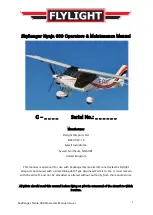
Vers.1.0
S. 7 / 30
Performance
The design of the ROLLING is based on the MENTOR which is well known
for its very good glide performance. The ROLLING has inherited the
MENTORs performance, which is unique in the segment of freestyle gliders.
This makes the ROLLING a very versatile glider, which can be even perfectly
used for XC-flying.
Target Group
The ROLLING aims to appeal all pilots who want to learn or refine the art of
acro and freestyle flying. Due to the high trim speed, the very agile handling
characteristic and the high safety potential the wing is an interesting choice for
pilots who are not particularly interested in acro flying and who just want to
enjoy a glider with great performance and sensitive feedback.
Pilots requirements:
We recommend the ROLLING for pilots who are already capable of certain
techniques, like controlling a glider in turbulent conditions: The pilot should be
able to prevent unwanted pitch or roll movement in bumpy air. If the pilot
enters a strong thermal, he should intuitionally release the brakes to stop the
glider from pitching backwards. When flying into sinking air, the pilot should
apply more brakes.
The ROLLING pilot should also be able to easily fly steep turns without
unwanted pendulum movement. We think, that a pilot, who is not capable of
those basic techniques will not be able to use the potential of the ROLLING in
a safe way.
We recommend to permanently work on your flying skills, by attending a SIV
course, by training take-offs an a training hill or by ground handling the glider.
All this will help you, to get a better understanding of your glider and to
become a better pilot.
Every pilot, who flies on their own has to be able to decide if their skills and
equipment is adequate for the respective conditions. The ROLLING offers a
high level of safety, but misjudgements may still have serious consequences.
Summary of Contents for ROLLING
Page 1: ...Vers 1 0 09 2010...
Page 25: ...Vers 1 0 S 25 30 Line plans...






























